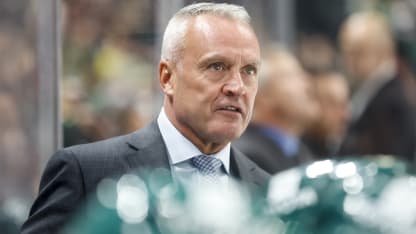The Coaches Room is a regular feature throughout the 2023-24 season by former NHL coaches and assistants who turn their critical gaze to the game and explain it through the lens of a teacher.
In this edition, Dean Evason, former coach of the Minnesota Wild and assistant with the Washington Capitals and Wild along with six seasons as the head coach of the Milwaukee Admirals in the American Hockey League, writes about the keys to keeping a team focused at this time of the season.
One day at a time. One game at a time.
Coaches roll their eyes at those cliches too, but they're so true and important, especially at this time of the season. With less than 20 games to go, the trade deadline behind us and the Stanley Cup Playoff stretch drive in front, it's so important for coaches to stay consistent with the one day at a time, one game at a time message to the players.
It can be hard with social media, all the apps, notifications that are coming up, the NHL sending all its things out for the players to not look at it and see where they're at and start to analyze that.
They get questions from media people about scoreboard watching, standings watching.
There are constant reminders all over the place and it can be hard to keep your group focused one way or the other.
If you're up, clinched already or close, it can be hard to keep the group going and motivated. If you're down, it can be a motivating factor, but it also can handcuff you a little bit by mentally thinking that you have to win every single hockey game.
The challenge for the coaching staff is to keep the players at a point where they can see what they need to do for the future, but they stay focused on the day at hand, the game at hand.
To make it easier and alleviate the pressure the team might be feeling I think it comes down to the preparation that you incorporated at the start of the year.
You control what you can control. Another cliche, but if your hockey team's mindset is trained to be there is nothing we can do about yesterday's game and there is nothing we can do yet about next week, that helps.
It can't be about flipping a switch now that the trade deadline has passed. You can't think, "Well, now we have our team and now we focus on playing just tonight and we don't worry about the rest." That's hard to do if you haven't been doing that all season.
But if you have been preparing that way all season long -- one day at a time, one game at a time -- it makes it a lot easier on the group. If you bring in a new player, he has to fit into that mindset and buy into it. You hope that your group has that mindset and is strong-willed enough to steer everybody that is brought in in the right direction.
But, again, it's not easy with all the information that is available to the coaches and players.
In Minnesota, our media relations person every day after the trade deadline would bring in a sheet of paper with strength of schedules for all teams in the race, point totals, playoff projections and predictions. Our analytics group would come in and give us numbers. The general manager would come in and talk about the need to win tonight to catch so and so or to stay above so and so.
It's all true, relevant and understandable from everybody's perspective. They're doing their jobs by keeping all of us up to date on what is going on outside of the team.
Some coaches want to see it all, every stat, every piece of information. I never did. I didn't see the point. If we didn't go out and beat the Nashville Predators that night, then all of that information really didn't matter.
I like less information at this time of the year because I like speaking to my group about my group, us, what we do. You know the players can see all the information too. What's available to us can be available to them. You can't hide it from them. But at the end of the day, the players don't need all the information. It's not part of their preparation to go win a hockey game. It's not part of their video sessions, pregame meetings, power play, penalty kill, systems, etc.
All they need to know is how they're going to play in that hockey game to beat the opponent that you're facing that night. And that's the stuff you've been doing all season.
You don't talk about teams you have to catch or teams that are chasing you in October, November or December, so you can't change and start doing that in March.
How you prepare and do things becomes routine. It can be superstition. If you flip things up and change it now to start talking about other teams, playoff races, stats, win-loss combinations needed to get you into the playoffs, the players will ask, "What are we doing here?"
You look after what you can look after. You do the exact same thing you've been doing since the start of the year. Keeping that consistent is key to preparation. The rest takes care of itself.
So, yes, it is all about one day at a time, one game at a time. It makes a difference.


















